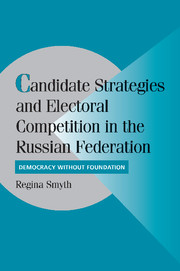 Candidate Strategies and Electoral Competition in the Russian Federation
Candidate Strategies and Electoral Competition in the Russian Federation Published online by Cambridge University Press: 25 July 2009
Nothing is less real than realism. Details are confusing. It is only by selection, by emphasis that we get at the real meaning of things.
Georgia O'Keeffe, 1922Until the 2003 election, students of Russian politics were deeply divided in their assessments of Russian democracy. The outcome of this election, and the subsequent emergence of a dominant political party in Russia, United Russia (UR), led a majority of scholars and policy analysts to conclude that Russia's nascent democracy was in crisis. As Vladimir Putin strengthened executive control over all aspects of governance in the wake of terrorist attacks in Moscow and in the Caucuses, there was growing concern that Russia's democratic experiment was over. Reflecting these concerns, in late 2004 Freedom House downgraded its assessment of Russian democracy.
The arguments presented here suggest that these changes were neither sudden nor should they have been unexpected. The imposition of proportional representation, the appointment of regional governors, and the abolition of term limits are consistent with, but not the inevitable consequence of, the actions of individual politicians taken in response to competitive elections, and were shaped by the political, social, and economic context of the Russian transition.
Recent scholarship sums up the paradox that marks Russia's political process: recurring competitive elections that propel the regime away from democracy by diminishing the capacity for organized opposition to a ruling party (Colton and Hale 2004; Colton and McFaul 2003a, b; Rose and Munro 2003). This puzzle is not only relevant for Russia.
To save this book to your Kindle, first ensure [email protected] is added to your Approved Personal Document E-mail List under your Personal Document Settings on the Manage Your Content and Devices page of your Amazon account. Then enter the ‘name’ part of your Kindle email address below. Find out more about saving to your Kindle.
Note you can select to save to either the @free.kindle.com or @kindle.com variations. ‘@free.kindle.com’ emails are free but can only be saved to your device when it is connected to wi-fi. ‘@kindle.com’ emails can be delivered even when you are not connected to wi-fi, but note that service fees apply.
Find out more about the Kindle Personal Document Service.
To save content items to your account, please confirm that you agree to abide by our usage policies. If this is the first time you use this feature, you will be asked to authorise Cambridge Core to connect with your account. Find out more about saving content to Dropbox.
To save content items to your account, please confirm that you agree to abide by our usage policies. If this is the first time you use this feature, you will be asked to authorise Cambridge Core to connect with your account. Find out more about saving content to Google Drive.